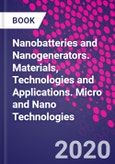The term 'nanobattery' can refer not only to the nanosized battery, but also to the uses of nanotechnology in a macro-sized battery for enhancing its performance and lifetime. Nanobatteries can offer many advantages over the traditional battery, including higher power density, shorter charging time, and longer shelf life. Nano-generators refer to the uses of nanosized devices and materials to convert mechanical, thermal and light-based energies into electricity. Similar to with traditional battery, in nanobatteries, the chemical energy is converted into electricity.
This book addresses the fundamental design concepts and promising applications of nanobatteries and nanogenerators. Particular application areas include healthcare, biomedical, smart nanodevices and nanosensors, which may require new electric power sources, including self-powered ability and nanostructured electric power sources. In this regard, nanobatteries and nanogenerators represent the next generation of electric power.
This is an important reference source for materials scientists, engineers and energy scientists, who are looking to increase their understanding of how nanotechnology is being used to create new energy storage and generation solutions.
Please Note: This is an On Demand product, delivery may take up to 11 working days after payment has been received.
Table of Contents
PART 1: BASIC PRINCIPLES 1. Nanobattery and Nanogenerator: An introduction 2. Methods for design and fabrication of nanobattery 3. Methods for characterization and evaluation of nanobattery 4. Nanoscale interface techniques for standardized integration of nanobattery 5. Mathematical modeling for charging and discharging processes of nanobattery 6. Methods for design and fabrication of nanogenerator 7. Methods for characterization and evaluation of nanogenerator 8. Nanoscale interface techniques for standardized integration of nanogenerator
PART 2: NANOMATERIALS FOR RECHARGEABLE BATTERY 9. Nanostructured anodes in rechargeable batteries� 10. Nanostructured cathodes in rechargeable batteries 11.Nanomaterials for electrolyte materials in rechargeable batteries 12. Nanostructured membranes for battery separators (polymer electrolyte nano-membranes) 13. Nanomaterials and nanotechnology for high-performance rechargeable battery
PART 3: NANOMATERIALS FOR PRIMARY BATTERY 14. Nanomaterials and nanotechnology for high-performance primary battery 15. Regulatory, toxicological and environmentally issues of nanobattery 16. Nanobattery waste management
PART 4: APPICATION OF NANOBATTERY 17. Nanodiagnostics using nanobatteries 18. Medical nano-tools 19. Nano-robots 20. Smart textiles 21. Nanosensors for smart cities 22. High performance electric vehicles
PART 5: APPICATIONS OF NANOGENERATOR 23. Corrosion protection of metals at the nanoscale (cathodic protection) 24. Self-powered nanosensors using nanogenerators 25. Nanogenerators in wearable sensors 26. Smart textiles (Wearable Devices) 27. Implanted devices (to regulate the heart rate .) 28. Organ-on-a-chip (heart-on-chip)
PART 6: FUTURE PERSPECTIVES 29. 3D-printed nanobatteries 30. Wearable nanobatteries and nanogenarators 31. Implanted nanogenerators 32. Smart nanosized battery 33. Nanopore battery array








